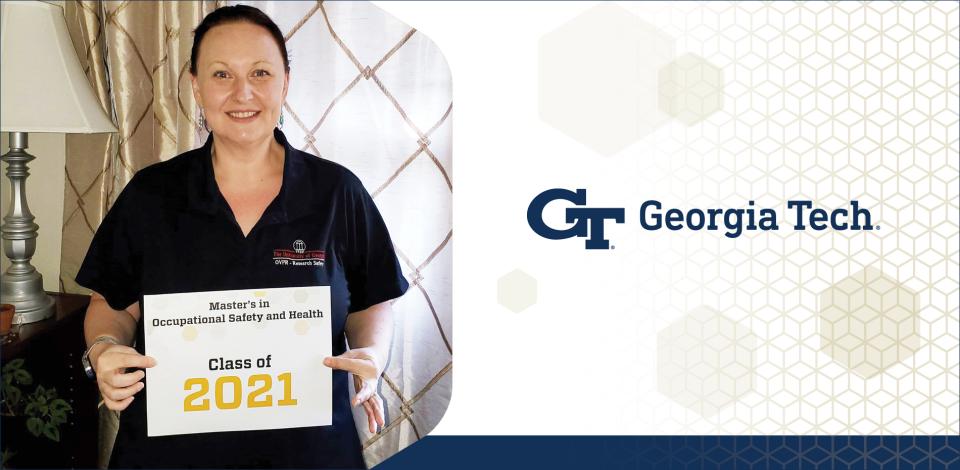Keeping Workplaces Healthy and Safe
How Cara Eck utilized safety and health training to transition from research safety into industrial hygiene

Cara Eck is a picture of lifelong learning. Having discovered her passion for safety and health, her career and learning journeys are evidence of the value that professional education provides for those who want to grow in — and beyond — their expertise.
Beginnings in Safety and Health
After receiving her bachelor’s degree in forestry, Eck decided to pursue a different career direction and began working in research safety at the University of Georgia (UGA). With over 2,000 research labs that use chemicals as well as biological and radioactive materials, UGA relies on its Office of Research Safety to ensure the safety of its research employees, even though it is not mandated by the Occupational Safety and Health Administration (OSHA). As the Assistant Safety and Compliance Officer, she supervised the labs’ safety standards and protocols — specifically related to chemical storage and safety equipment — to ensure that they were adhering to federal, state, and university guidelines.
Eck was drawn to the occupational safety and health (OSH) industry because of its direct, positive impact on the people it serves. “There are very few jobs out there right now that allow you to do something that makes such a huge impact on people,” she said. “Not just one or two people, but a lot of people.” Every day, Eck's safety inspections and recommendations helped save lives by creating safer work environments for the many employees who worked there.
Pursuing a Master's in Occupational Safety and Health
When Eck's boss, an alumnus of Georgia Tech, received an email about Georgia Tech's Professional Master’s in Occupational Safety and Health (PMOSH) program, he encouraged her to enroll.
Throughout the two-year learning experience, Eck continued to work full-time, and she found that everything she learned through PMOSH directly applied to her work in research safety, and she enjoyed adding new knowledge to her repertoire by learning the foundations of OSHA, which provided new perspectives and practices that she could apply in her workplace. “I found it very valuable to be able to take things I was not familiar with and apply to my department,” she said.
Although she was working full-time, Eck was not overwhelmed by balancing work, learning, and life. The courses were rigorous and demanding, but their slow pacing made them manageable. She took only one online class at a time, each of which focused on one topic over seven weeks, and they provided several opportunities and resources for her to seek out assistance and information when needed.
Beyond the content, Eck also greatly benefitted from the community of the PMOSH program. From orientation to her final capstone project, she learned from and grew with her fellow cohort members. “My cohort members were amazing,” she recalled. “They were professionals who knew their craft forwards and backward, so when it came to working with them, I gained so much knowledge from them that was over and above the program itself.” She became good friends with her classmates, and she continues to stay in contact with them. “I still have a relationship with these people. We keep in touch because we actually lean on one another for information and advice.”
The Transition to Industrial Hygiene
Through the PMOSH program, Eck learned about Georgia Tech’s Industrial Hygiene and Occupational Safety Program. One of her favorite instructors, Jenny Houlroyd, taught an introduction to industrial hygiene course, and she both loved the content and excelled in learning. When she learned that a job opportunity opened in the Industrial Hygiene program at Georgia Tech, she was interested in gaining new skills from a different perspective within the safety industry. “I could not pass up the opportunity to see if Tech could be another place for me to grow in my skills.” She applied for the position and got the job. After graduating from the PMOSH program in August 2021, she began working as an industrial hygienist for Georgia Tech in November.
In her new role, Eck has been able to apply everything she learned in PMOSH in her day-to-day responsibilities as she provides consultations on safety and health standards at construction sites around Atlanta. By reviewing various aspects of the sites that may affect workers’ safety and health, like air quality and noise levels, she provides recommendations to minimize the risk of injury or accidents, which include measures such as personal protective wear equipment, administrative controls, and engineering controls.
Though she has pivoted to a new field within the industry, Eck still enjoys the knowledge that she has helped safeguard her clients’ workplaces and improved their work experiences. The safety recommendations that she provides every day “could mean that somebody who might have had some serious accident at work gets to go home safe that night instead,” she explained, “and their family doesn’t have to worry about losing them because we have made their workplace safer. That, to me, is the most rewarding thing. I know I’m making a difference.”
By extension, her work in safety assurance provides a trickle-down effect on workplace satisfaction. “Another thing that happens when you make a place safer is that the employees become happier,” she said, “and they get a feeling that their place of employment cares about them. I like seeing that.”
A Safety Career Built on Lifelong Learning
Looking toward the future, Eck is certain about her place in the safety industry. After completing the PMOSH program, she plans to continue bolstering her knowledge about industry practices with additional safety and health courses, knowing that every piece of information is useful in the field. “Every program that I take is just a little bit more knowledge that I can take and apply to my job.” She has already almost completed the Safety and Health Management Certificate, and after doing so, she plans to begin working on the Industrial Safety and Health Certificate.
Having seen the benefits of classroom learning in the workplace, she wants to help pass along the knowledge that she has gained, perhaps even by teaching at Georgia Tech Professional Education (GTPE). “I want to share this wealth of information,” she said. “A lot of these classes at GTPE are given to other safety professionals that work for other smaller companies or OSHA, and they can take this information and share it in the same way that I am.”
Written By Rachel Meyer

